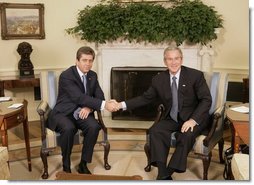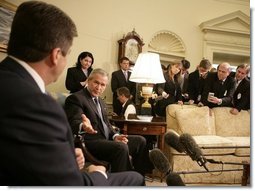
- Afghanistan
- Africa
- Budget Management
- Defense
- Economy
- Education
- Energy
- Environment
- Global Diplomacy
- Health Care
- Homeland Security
- Immigration
- International Trade
- Iraq
- Judicial Nominations
- Middle East
- National Security
- Veterans
|
Home >
News & Policies >
October 2005
|
For Immediate Release
Office of the Press Secretary
October 17, 2005
President Meets with Bulgarian President Georgi Purvanov
The Oval Office
10:53 A.M. EDT
PRESIDENT BUSH: We'll have opening statements, two questions a side. Welcome, Mr. President.
Mr. President, your country is a strategic ally. It's been my honor to welcome you to the Oval Office and thank you for a wide-ranging discussion on a lot of important topics.
Bulgaria has been a valued partner in NATO. Your country has been a strong example for democracy. You understand, like I understand, that the march of democracy will lead to world peace. I want to thank you for being a part of a vast coalition that helped liberate 50 million people. We discussed important bilateral issues.
 And I want to thank you again for coming, thank you for your leadership and thank you for your friendship.
And I want to thank you again for coming, thank you for your leadership and thank you for your friendship.
PRESIDENT PURVANOV: (As translated.) Thank you, Mr. President. Ladies and gentlemen, I would like to say how pleased I am with the discussions we just had with Mr. President. I am delighted that we had a chance to reaffirm our specific partnership and to discuss, to go through the agenda of some specific issues related.
I do appreciate the support we have been receiving from the United States in becoming a reliable NATO member state, and also in joining the European Union in time, that is, as of January '07. I value the high appreciation of Bulgaria's role as a stabilizing factor in the Balkans that we receive.
I had the chance to reaffirm Bulgaria's commitment to remain an ally of the anti-terrorist coalition. Of course, the specifics of that are going to be discussed on an expert level. I appreciate the opportunity to raise some concrete, specific issues and put on the table Bulgaria's ambitions, particularly to get its military modernized and to be involved in some energy products in the Balkans.
And I'm sure that after these meetings and talks, our institutions and the people concerned, the experts will have a lot of work to do in order to guarantee an influx of investment. I'm particularly pleased with this very frank -- open and frank discussions we had.
PRESIDENT BUSH: Thank you. Answer a couple of questions -- hold a second, please. We'll go to the American side first. Deb.
Q Mr. President, would you expect a member of your administration to resign or take leave if they were indicted?
PRESIDENT BUSH: Mr. President, there's an investigation going on; I've made it very clear to the press that I'm not going to discuss the investigation. And so, therefore -- and so my position hasn't changed since the last time I've been asked this question. There's a serious investigation. We're not going to -- I'm not going to pre-judge the outcome of the investigation.
Yes.
Q Mr. President, first, we remember 9/11 and we thank you for your leadership, sir. The question is, in Bulgarian public opinion knows quite well that the most important thing for us is to get our nurses back from the jail in Libya, because they're facing a firing squad, sir, after few weeks if the verdict is confirmed. So we are partners. You're the leader of the most powerful nation on Earth. Why don't you help us, sir?
 PRESIDENT BUSH: Do you want to interpret that?
PRESIDENT BUSH: Do you want to interpret that?
We discussed this issue at length. Like the President, my heart breaks when young children get sick. The position of the United States government is the nurses ought to be freed. We have made our position known to the Libyan government. There's no confusion -- there should be no confusion in the Libyan government's mind. But those nurses ought to be not only spared their life, but out of prison. And we will continue to make that message perfectly clear.
Steve.
Q Sir, the vote on Saturday, does the Sunni vote against the Iraqi constitution damage the political process? Will it increase the likelihood of violence and American sacrifice?
PRESIDENT BUSH: My first reaction to the vote was that an increase in turnout was an indication that the Iraqi people are strongly in favor of settling disputes in a peaceful way; that they understand that working to find common ground on a constitution is much better for their future than relying upon killers and people who will kill innocent children and women for the sake of creating havoc.
Secondly, I was pleased to see that the Sunnis participated in the process. The idea of deciding to go into a ballot box is a positive development. The idea that people are willing to try to work out their political differences through a process, a peaceful process, stands in stark contrast to the al Qaeda types and the terrorists and the killers that are trying to drive the process through violence.
The way forward is clear. The political process will continue with a constitution, if finally ratified, and then an election, coupled with a security plan that continues to train Iraqis so they do the fight. The violence in this election was down from the previous election. And one of the reasons why is because the Iraqi forces took the fight to the enemy -- and provided security, which is really heartening to coalition forces and friends and allies.
So yesterday was a very hopeful day for peace. It's an exciting day for a country that only a few short years ago was ruled by a brutal tyrant. So I'm pleased with the progress being made.
Q What do you think of Bulgaria's role -- of your ally, Bulgaria, as a regional leader in the Balkans?
PRESIDENT BUSH: I think the -- I watched your election -- recent parliamentary elections very closely. The people voted. And then coalitions were formed for the good of the country. That's an example that many can learn from. There's nothing more wholesome than a young democracy, not only setting an example for others, but taking a lead in explaining to citizens that the best way to resolve differences is through a political process that is peaceful.
And so the President and I talked about Bulgaria's important role in taking the lead in helping young democracies grow in strength. We're laying the foundation for peace. Democracies are peaceful. They're at peace with their neighbors. And the Balkans needs peace, the Middle East needs peace. And working with friends like Bulgaria, we are laying that foundation for peace.
I'm proud to have your friendship. Thank you.
END 11:06 A.M. EDT


